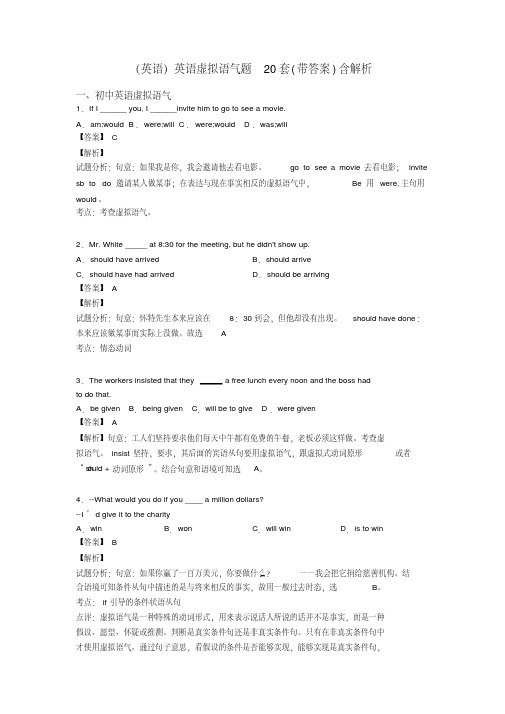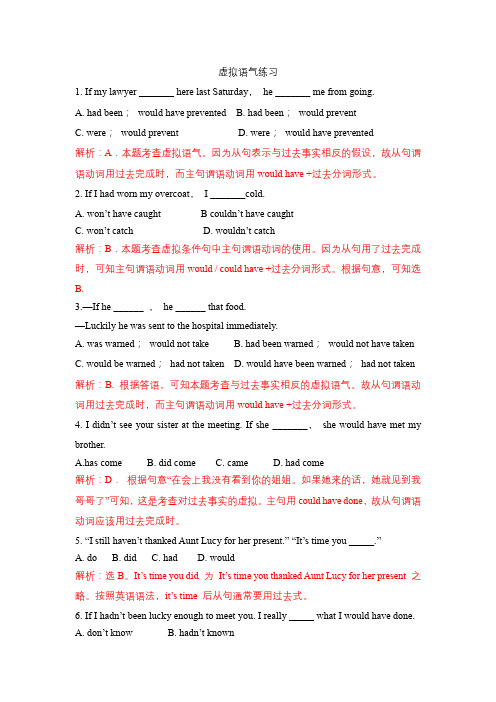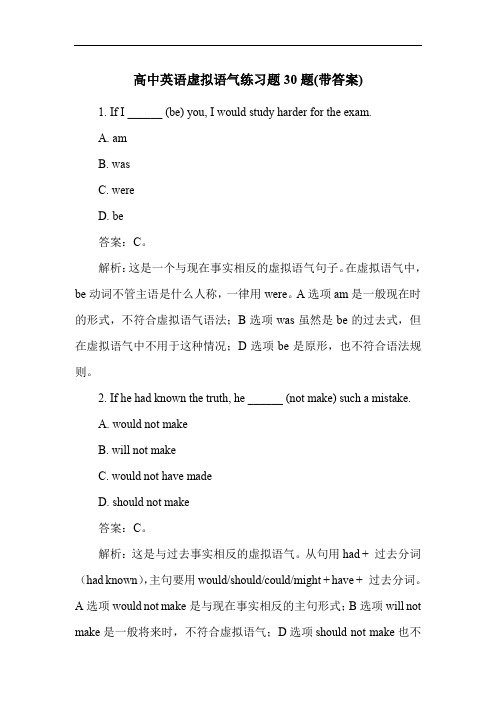虚拟语气详解、练习及答案
虚拟语气讲解及练习题(含答案和解释)

高中英语虚拟语气讲解及练习虚拟条件句就是对现实条件的一种虚拟假设,所假设的条件一般不符合事实或与事实相反或在现实中发生的可能性极小。
根据时间的不同,虚拟条件句可分为三种,即与现在事实相反的虚拟条件句、与过去事实相反的虚拟条件句(1)表示与现在事实相反If I had enough money now, I would lend it to you.(2)表示与过去事实相反If he had taken your advice, he wouldn’t have made such a bad mistake.(3)表示与将来事实相反I would go shopping with you if it were to be Sunday tomorrow.1. 虚拟条件句的倒装在虚拟条件句中,为了强调所假设条件的虚拟性,或突出说话人的一种主观愿望,虚拟条件句可用倒装结构。
虚拟条件句的倒装是通过去掉if,把条件从句谓语中的助动词、情态动词或系动词放在句首实现的。
例如:Had I been(= If I had been ) in that situation, I would not have let the thief escape away with so much money.Should there be (= If there should be) a drought, what should we do at that time ?2. 错综时间条件句有时条件从句的动作和主句的动作发生的时间并不一致,这时谓语动词的形式应根据它所要表示的具体时间来确定。
例如:If we hadn’t been working hard in the past few years ,thing s wouldn’t be going so smoothly.3. 含蓄条件句有时假设的情况并不以条件从句的形式表现出来,而是通过某个介词或介词短语(如:with,otherwise,without,but for,in that position)、上下文或其它方式表现出来。
虚拟语气讲解及练习(有答案)

高中英语虚拟语气讲解及练习虚拟条件句就是对现实条件的一种虚拟假设,所假设的条件一般不符合事实或与事实相反或在现实中发生的可能性极小。
根据时间的不同,虚拟条件句可分为三种,即与现在事实相反的虚拟条件句、与过去事实相反的虚拟条件句(1)表示与现在事实相反If I had enough money now, I would lend it to you.(2)表示与过去事实相反If he had taken your advice, he wouldn’t have made such a bad mistake.(3)表示与将来事实相反I would go shopping with you if it were to be Sunday tomorrow.1. 虚拟条件句的倒装在虚拟条件句中,为了强调所假设条件的虚拟性,或突出说话人的一种主观愿望,虚拟条件句可用倒装结构。
虚拟条件句的倒装是通过去掉if,把条件从句谓语中的助动词、情态动词或系动词放在句首实现的。
例如:Had I been(= If I had been ) in that situation, I would not have let the thief escape away with so much money.Should there be (= If there should be) a drought, what should we do at that time ?2. 错综时间条件句有时条件从句的动作和主句的动作发生的时间并不一致,这时谓语动词的形式应根据它所要表示的具体时间来确定。
例如:If we hadn’t been working hard in the past few years ,thing s wouldn’t be going so smoothly.3. 含蓄条件句有时假设的情况并不以条件从句的形式表现出来,而是通过某个介词或介词短语(如:with,otherwise,without,but for,in that position)、上下文或其它方式表现出来。
高三英语虚拟语气特殊用法练习题40题含答案解析

高三英语虚拟语气特殊用法练习题40题含答案解析1.If I were you, I _____ study harder.A.willB.wouldC.canD.must答案解析:B。
本题考查虚拟语气中对现在情况的虚拟。
if 引导的条件句用一般过去时(be 动词用were),主句用would/could/should/might+动词原形。
A 选项will 不是虚拟语气的用法;C 选项can 也不是虚拟语气的用法;D 选项must 不是虚拟语气的正确表达。
2.If I _____ enough time, I would travel around the world.A.haveB.hadC.hasD.having答案解析:B。
这是对现在情况的虚拟语气。
if 条件句用一般过去时,had 是have 的过去式。
A 选项have 不是虚拟语气用法;C 选项has 用于一般现在时的第三人称单数,不符合虚拟语气要求;D 选项having 不能单独做谓语。
3.If he _____ more careful, he wouldn't have made so many mistakes.A.wereB.would beC.had beenD.be答案解析:C。
本题考查对过去情况的虚拟语气。
if 条件句用had+过去分词,主句用would/could/should/might+have+过去分词。
A 选项were 是对现在情况虚拟的用法;B 选项would be 不是虚拟语气的正确表达;D 选项be 不能单独使用。
4.If she _____ to my advice, she wouldn't be in such trouble now.A.listenedB.had listenedC.would listenD.should listen答案解析:B。
对过去情况的虚拟。
if 条件句用had+过去分词,主句用would/could/should/might+动词原形。
英语虚拟语气题20套(带答案)含解析

(英语)英语虚拟语气题20套(带答案)含解析一、初中英语虚拟语气1.If I ______ you, I ______invite him to go to see a movie.A.am;would B.were;will C.were;would D.was;will【答案】C【解析】试题分析:句意:如果我是你,我会邀请他去看电影。
go to see a movie去看电影;invite sb to do邀请某人做某事;在表达与现在事实相反的虚拟语气中,Be用were,主句用would。
考点:考查虚拟语气。
2.Mr. White _____ at 8:30 for the meeting, but he didn't show up.A.should have arrived B.should arriveC.should have had arrived D.should be arriving【答案】A【解析】试题分析:句意:怀特先生本来应该在8:30到会,但他却没有出现。
should have done:本来应该做某事而实际上没做。
故选A考点:情态动词3.The workers insisted that they a free lunch every noon and the boss hadto do that.A.be given B.being given C.will be to give D.were given【答案】A【解析】句意:工人们坚持要求他们每天中午都有免费的午餐,老板必须这样做。
考查虚拟语气。
insist坚持,要求,其后面的宾语从句要用虚拟语气,跟虚拟式动词原形或者“sh ould + 动词原形” 。
结合句意和语境可知选A。
4.--What would you do if you ____ a million dollars?--I’d give it to the charityA.win B.won C.will win D.is to win【答案】B【解析】试题分析:句意:如果你赢了一百万美元,你要做什么?——我会把它捐给慈善机构。
虚拟语气练习含答案

虚拟语气练习1. If my lawyer _______ here last Saturday,he _______ me from going.A. had been;would have preventedB. had been;would preventC. were;would preventD. were;would have prevented解析:A.本题考查虚拟语气。
因为从句表示与过去事实相反的假设,故从句谓语动词用过去完成时,而主句谓语动词用would have +过去分词形式。
2. If I had worn my overcoat,I _______cold.A. won’t have caught B couldn’t have caughtC. won’t catchD. wouldn’t catch解析:B.本题考查虚拟条件句中主句谓语动词的使用。
因为从句用了过去完成时,可知主句谓语动词用would / could have +过去分词形式。
根据句意,可知选B.3.—If he ______ ,he ______ that food.—Luckily he was sent to the hospital immediately.A. was warned;would not takeB. had been warned;would not have takenC. would be warned;had not takenD. would have been warned;had not taken 解析:B. 根据答语,可知本题考查与过去事实相反的虚拟语气。
故从句谓语动词用过去完成时,而主句谓语动词用would have +过去分词形式。
4. I didn’t see your sister at the meeting. If she _______,she would have met my brother.A.has comeB. did comeC. cameD. had come解析:D.根据句意“在会上我没有看到你的姐姐。
高中英语虚拟语气练习题30题(带答案)

高中英语虚拟语气练习题30题(带答案)1. If I ______ (be) you, I would study harder for the exam.A. amB. wasC. wereD. be答案:C。
解析:这是一个与现在事实相反的虚拟语气句子。
在虚拟语气中,be动词不管主语是什么人称,一律用were。
A选项am是一般现在时的形式,不符合虚拟语气语法;B选项was虽然是be的过去式,但在虚拟语气中不用于这种情况;D选项be是原形,也不符合语法规则。
2. If he had known the truth, he ______ (not make) such a mistake.A. would not makeB. will not makeC. would not have madeD. should not make答案:C。
解析:这是与过去事实相反的虚拟语气。
从句用had + 过去分词(had known),主句要用would/should/could/might + have + 过去分词。
A选项would not make是与现在事实相反的主句形式;B选项will not make是一般将来时,不符合虚拟语气;D选项should not make也不是与过去事实相反的虚拟语气主句形式。
3. If it ______ (rain) tomorrow, we would cancel the picnic.A. rainsB. rainedC. will rainD. should rain答案:D。
解析:这是与将来事实相反的虚拟语气。
在这种情况下,从句可以用should + 动词原形,或者were to + 动词原形,或者一般过去时(这里的一般过去时表示的是一种假设的将来情况)。
A选项rains是一般现在时,用于真实条件句;B选项rained虽然是过去式,但在这里如果单独用过去式表达将来不太准确;C选项will rain是一般将来时,不符合虚拟语气语法。
高中英语 虚拟语气讲解及练习(有答案)
高中英语虚拟语气讲解及练习虚拟条件句就是对现实条件的一种虚拟假设,所假设的条件一般不符合事实或与事实相反或在现实中发生的可能性极小。
根据时间的不同,虚拟条件句可分为三种,即与现在事实相反的虚拟条件句、与过去事实相反的虚拟条件句(1)表示与现在事实相反If I had enough money now, I would lend it to you.(2)表示与过去事实相反If he had taken your advice, he wouldn’t have made such a bad mistake.(3)表示与将来事实相反I would go shopping with you if it were to be Sunday tomorrow.1. 虚拟条件句的倒装在虚拟条件句中,为了强调所假设条件的虚拟性,或突出说话人的一种主观愿望,虚拟条件句可用倒装结构。
虚拟条件句的倒装是通过去掉if,把条件从句谓语中的助动词、情态动词或系动词放在句首实现的。
例如:Had I been(= If I had been ) in that situation, I would not have let the thief escape away with so much money.Should there be (= If there should be) a drought, what should we do at that time ?2. 错综时间条件句有时条件从句的动作和主句的动作发生的时间并不一致,这时谓语动词的形式应根据它所要表示的具体时间来确定。
例如:If we hadn’t been working hard in the past few years ,thing s wouldn’t be going so smoothly.3. 含蓄条件句有时假设的情况并不以条件从句的形式表现出来,而是通过某个介词或介词短语(如:with,otherwise,without,but for,in that position)、上下文或其它方式表现出来。
高中英语虚拟语气讲解及练习题(附答案)
高中英语虚拟语气讲解及练习虚拟条件句就是对现实条件的一种虚拟假设,所假设的条件一般不符合事实或与事实相反或在现实中发生的可能性极小。
根据时间的不同,虚拟条件句可分为三种,即与现在事实相反的虚拟条件句、与过去事实相反的虚拟条件句(1)表示与现在事实相反If I had enough money now, I would lend it to you.(2)表示与过去事实相反If he had taken your advice, he wouldn’t have made such a bad mistake.(3)表示与将来事实相反I would go shopping with you if it were to be Sunday tomorrow.1. 虚拟条件句的倒装在虚拟条件句中,为了强调所假设条件的虚拟性,或突出说话人的一种主观愿望,虚拟条件句可用倒装结构。
虚拟条件句的倒装是通过去掉if,把条件从句谓语中的助动词、情态动词或系动词放在句首实现的。
例如:Had I been(= If I had been ) in that situation, I would not have let the thief escape away with so much money.Should there be (= If there should be) a drought, what should we do at that time ?2. 错综时间条件句有时条件从句的动作和主句的动作发生的时间并不一致,这时谓语动词的形式应根据它所要表示的具体时间来确定。
例如:If we hadn’t been working hard in the past few years ,thing s wouldn’t be going so smoothly.3. 含蓄条件句有时假设的情况并不以条件从句的形式表现出来,而是通过某个介词或介词短语(如:with,otherwise,without,but for,in that position)、上下文或其它方式表现出来。
虚拟语气讲解及练习题(含答案和解释)
高中英语虚拟语气讲解及练习虚拟条件句就是对现实条件的一种虚拟假设,所假设的条件一般不符合事实或与事实相反或在现实中发生的可能性极小。
根据时间的不同,虚拟条件句可分为三种,即与现在事实相反的虚拟条件句、与过去事实相反的虚拟条件句(1)表示与现在事实相反If I had enough money now, I would lend it to you.(2)表示与过去事实相反If he had taken your advice, he wouldn’t have made such a bad mistake.(3)表示与将来事实相反I would go shopping with you if it were to be Sunday tomorrow.1. 虚拟条件句的倒装在虚拟条件句中,为了强调所假设条件的虚拟性,或突出说话人的一种主观愿望,虚拟条件句可用倒装结构。
虚拟条件句的倒装是通过去掉if,把条件从句谓语中的助动词、情态动词或系动词放在句首实现的。
例如:Had I been(= If I had been ) in that situation, I would not have let the thief escape away with so much money.Should there be (= If there should be) a drought, what should we do at that time ?2. 错综时间条件句有时条件从句的动作和主句的动作发生的时间并不一致,这时谓语动词的形式应根据它所要表示的具体时间来确定。
例如:If we hadn’t been working hard in the past few years ,thing s wouldn’t be going so smoothly.3. 含蓄条件句有时假设的情况并不以条件从句的形式表现出来,而是通过某个介词或介词短语(如:with,otherwise,without,but for,in that position)、上下文或其它方式表现出来。
高中英语虚拟语气详解及练习(包含答案)
高中英语虚拟语气讲解及练习虚拟条件句就是对现实条件的一种虚拟假设,所假设的条件一般不符合事实或与事实相反或在现实中发生的可能性极小。
根据时间的不同,虚拟条件句可分为三种,即与现在事实相反的虚拟条件句、与过去事实相反的虚拟条件句(1)表示与现在事实相反If I had enough money now, I would lend it to you.(2)表示与过去事实相反If he had taken your advice, he wouldn’t have made such a bad mistake.(3)表示与将来事实相反I would go shopping with you if it were to be Sunday tomorrow.1. 虚拟条件句的倒装在虚拟条件句中,为了强调所假设条件的虚拟性,或突出说话人的一种主观愿望,虚拟条件句可用倒装结构。
虚拟条件句的倒装是通过去掉if,把条件从句谓语中的助动词、情态动词或系动词放在句首实现的。
例如:Had I been(= If I had been ) in that situation, I would not have let the thief escape away with so much money.Should there be (= If there should be) a drought, what should we do at that time ?2. 错综时间条件句有时条件从句的动作和主句的动作发生的时间并不一致,这时谓语动词的形式应根据它所要表示的具体时间来确定。
例如:If we hadn’t been working hard in the past few years ,thing s wouldn’t be going so smoothly.3. 含蓄条件句有时假设的情况并不以条件从句的形式表现出来,而是通过某个介词或介词短语(如:with,otherwise,without,but for,in that position)、上下文或其它方式表现出来。
- 1、下载文档前请自行甄别文档内容的完整性,平台不提供额外的编辑、内容补充、找答案等附加服务。
- 2、"仅部分预览"的文档,不可在线预览部分如存在完整性等问题,可反馈申请退款(可完整预览的文档不适用该条件!)。
- 3、如文档侵犯您的权益,请联系客服反馈,我们会尽快为您处理(人工客服工作时间:9:00-18:30)。
1 / 1 虚拟语气 虚拟语气(the subjunctive mood),又称假设语气,是谓语动词的一种形式,表示说话人叙述的内容与事实相反,在现实中并不存在,或实现的可能性很小。
一、动词的语气
语气用来区别讲话人对某一行为或事情的看法和态度。英语中的语气(mood)有三种,分别是陈述语气、祈使语气和虚拟语气。
1.陈述语气 陈述语气一般用来叙述事实或就事实提出询问,主要用于陈述句、疑问句和某些感叹句。 Where there is a will, there's a way. 有志者事竟成。 Can you help me carry the box upstairs 你能帮我把箱子搬到楼上吗? How I missed the life in the countryside! 我多么想念乡村的生活啊!
2.祈使语气 祈使语气表示说话人向对方提出请求或下达命令。 Come this way, please! 请这边走。 Don't make any noise, will you 别吵,行吗? Do be careful when crossing the street. 过马路时一定要小心。
3.虚拟语气 虚拟语气表示动作或状态不是客观存在的事实,而是说话人的主观愿望、假设或推测等。 If I were a bird, I could fly in the air. 如果我是一只小鸟,我就能在空中飞行。 I wish it were spring all the year round. 但愿四季如春。 May good luck be yours! 祝你好运!
二、条件句中的虚拟语气
英语中条件从句有两类,一类是真实条件句,另一类是非真实条件句。如果假设的情况可能发生,是真实条件句;如果假设的情况是不存在的或不大可能发生的,则是虚拟条件句。
A.真实条件句 真实条件句表示的假设是可能发生或实现的,主句和从句的谓语动词都要用陈述语气。 If he doesn't come at 8, we won't wait for him. 如果他八点不来,我们就不等他了。 If a flood happened in the past, there was usually a great loss of life and property. 1 / 1
过去发生洪水的话,常有很大的生命和财产损失。 We shall go there unless it rains tomorrow. 如果明天不下雨,我们将去那里。 I'll let you use my bike on condition that you keep it clean. 如果你能保持车子干净,我就让你用我的自行车。
B.非真实条件句 在含有非真实条件句的复合句中,主句和从句的谓语动词都要用虚拟语气,其构成有三种形式: 与现在事实相反 if条件句的谓语:were did 主句的谓:would (could should might) + do 与过去事实相反 if条件句的谓语:had done 主句的谓:would(could should might) + have done 与将来事实相反 if条件句的谓语:did were 主句的谓:should do would (could should might) + do were to do
从句中提出一种与客观现实不相符或根本不可能存在的条件,主句会产生的一种不可能获得的结果。条件句中的虚拟语气根据不同的时间有三种不同的形式。 时间 从句谓语形式 主句谓语形式
将来 动词过去式(be用were) should + 动词原形 were to + 动词原形 would / should / might / could + 动词原形 现在 动词过去式(be 用 were) would / should / might / could + 动词原形 过去 had +动词过去分词 would / should / might / could have + 动词过去分词
1. 表示与现在事实相反的条件
条件从句用动词的过去式(be动词用were),主句用should(第一人称)或would(全部人称)+动词原形。可用情态动词could, might代替should, would表示情态。 If it were Sunday tomorrow, I would go and see my friends. 明天要是星期天的话,我就去看望我的朋友。 If I were you, I should go and try. 我要是你,我就去试试。 If wishes were horses, beggars might ride. 如果幻想能成为马匹,叫花子都有了坐骑 would go if they treated me like a slave. 要是他们把我当奴隶对待,我就走。
2.表示与过去事实相反的条件 条件从句用动词的过去完成时,主句用should(第一人称)或would(全部人称)+have done,也可用could, might代替should, would。 1 / 1
If I had known your telephone number yesterday, I would have telephoned you. 如果昨天我知道你的电话号码,我就给你打电话了。 If it had not rained this morning, I should have gone shopping. 今天早上要是没下雨,我就去买东西了。 The flood might have caused great damages to the people if we had not built so many reservoirs. 倘若我们没有修建这么多的水库,洪水就会使人民遭受巨大的损失。
3. 表示在将来不太可能实现的条件 表示在将来不太可能实现的条件从句有三种形式: ① were did
条件从句用动词的过去式(be动词用were),主句用should(第一人称)或would(全部人称)+动词原形。也可用could, might代替should, would。 If he were here tomorrow, I would speak to him. 明天如果他在这里的话,我就和他谈谈。 If you dropped the glass, it would break. 你要是把杯子掉下来,会打碎的。 If she had time, she could help me. 她要是有时间,就会帮我了。 ② should do 条件从句中不管什么人称都用should do,可表示有偶然实现的可能性。 If it should rain, the crops could be saved. 假如下雨,庄稼可能就有救了。 We would trust him if he should be honest. 如果他真是诚实的,那我们就相信他。 ③ were to do 条件从句用were + to do。这种形式比较正式,常出现在书面语中,其假设成份很大,实现的可能性很小。 If I were to do the work, I should do it in a different way. 要是我做这项工作,我就会以不同的方式去做。 If the headmaster were to come, what would we say to him 假如校长来了,我们对他说什么呢? 对比: 将来不太可能实现的三种非真实条件句中的虚拟语气对比 If it snowed tomorrow, I would stay at home. 如果明天下雪的话,我就留在家里。 (常用形式) If it should snow tomorrow, I would stay at home. 如果明天下雪的话,我就留在家里。 (可能性较小) If it were to snow tomorrow, I would stay at home. 如果明天要下雪的话,我就留在家里。(可能性最小)
3. 运用条件句中的虚拟语气时,须注意的几个问题 (1) 当从句的主语为第三人称单数时,谓语动词若是系动词be时,可用was代替were。但在倒装虚拟结构及if I were you, as it were中,只能用were。如: Were I ten years younger, I would study abroad. 要是我还年轻十岁的话,我会去国外学习。 1 / 1
If I were you, I would try my best to grasp the chance. 要是我是你的话,我要尽力抓住这次机会。 (2) 有时,虚拟条件句中,主、从句的动作若不是同时发生时,须区别对待。 ①从句的动作与过去事实相反,而主句的动作与现在或现在正在发生的事实不符。如: If I had worked hard at school, I would be an engineer, too. 如果我在学校学习刻苦的话,我现在也会使工程师了 If they had informed us, we would not come here now. 如果他们通知过我们的话,我们现在就不会来这里了。 ②从句的动作与现在事实相反,而主句的动作与过去事实不符。如: If he were free today, we would have sent him to Beijing. 如果他今天有空的话,我们会已经派他去北京了(from )。 If he knew her, he would have greeted her. 要是他认识她的话,他肯定会去问候她了。 ③从句的动作与过去发生的情况相反,而主句的动作与现在正在发生的情况相反。如: If it had not been raining too much, the crops would be growing much better. 如果天不下太多的雨的话,庄家会长得更好。 If he had been working hard, he would be working in the office now. 要是他工作一直努力的话,他现在已进了办公室了。 (3) 当虚拟条件句的谓语动词含有were, should, had时,if可省略,而将were, should, had等词置于句首。如: Should he agree to go there, we would send him there. 要是他答应去的话,我们就派他去。 Were she here, she would agree with us. 如果她在这儿的话,她会同意我们的。 Had he learnt about computers, we would have hired him to work here. 如果她懂一些电脑知识的话,我们会已经聘用他来这里工作了(from )。 (4) 有时,句子没有直接给出假设情况的条件,而须通过上下文或其他方式来判断。如: I would have come to see you, but I was too busy. 我本该来看你了,然而我太忙了。 But for his help, we would be working now. 要不是他的帮助,我们还会在工作呢。 Without your instruction, I would not have made such great progress. 要是没有你的指导,我不会取得如此大的进步。
